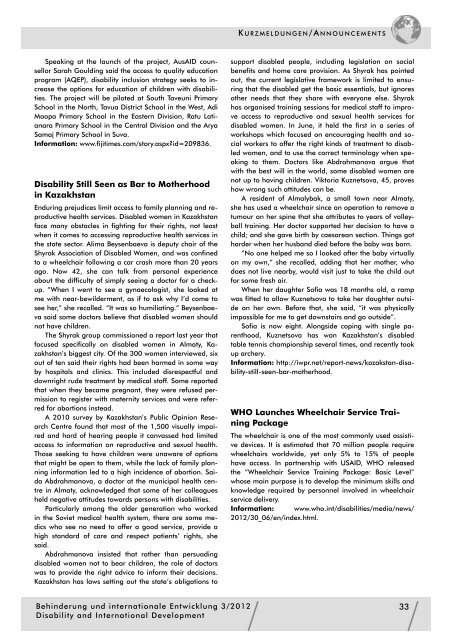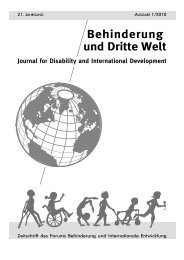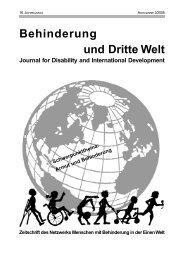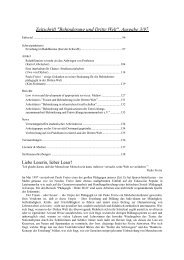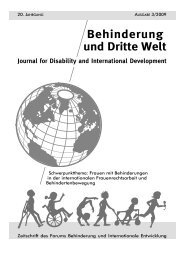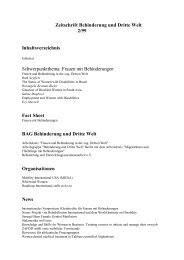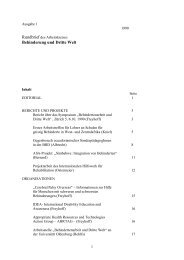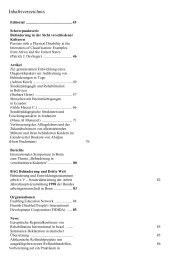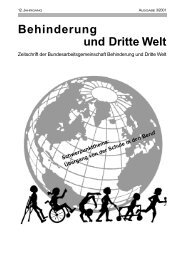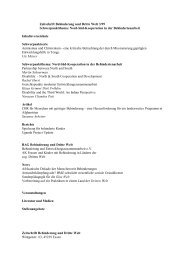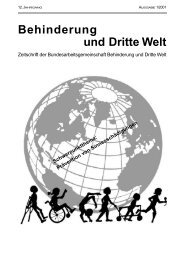Behinderung und internationale Entwicklung Disability and ...
Behinderung und internationale Entwicklung Disability and ...
Behinderung und internationale Entwicklung Disability and ...
Create successful ePaper yourself
Turn your PDF publications into a flip-book with our unique Google optimized e-Paper software.
K URZMELDUNGEN/ANNOUNCEMENTSSpeaking at the launch of the project, AusAID counsellorSarah Goulding said the access to quality educationprogram (AQEP), disability inclusion strategy seeks to increasethe options for education of children with disabilities.The project will be piloted at South Taveuni PrimarySchool in the North, Tavua District School in the West, AdiMaopa Primary School in the Eastern Division, Ratu LatianaraPrimary School in the Central Division <strong>and</strong> the AryaSamaj Primary School in Suva.Information: www.fijitimes.com/story.aspx?id=209836.<strong>Disability</strong> Still Seen as Bar to Motherhoodin KazakhstanEnduring prejudices limit access to family planning <strong>and</strong> reproductivehealth services. Disabled women in Kazakhstanface many obstacles in fighting for their rights, not leastwhen it comes to accessing reproductive health services inthe state sector. Alima Beysenbaeva is deputy chair of theShyrak Association of Disabled Women, <strong>and</strong> was confinedto a wheelchair following a car crash more than 20 yearsago. Now 42, she can talk from personal experienceabout the difficulty of simply seeing a doctor for a checkup.“When I went to see a gynaecologist, she looked atme with near-bewilderment, as if to ask why I’d come tosee her,” she recalled. “It was so humiliating.” Beysenbaevasaid some doctors believe that disabled women shouldnot have children.The Shyrak group commissioned a report last year thatfocused specifically on disabled women in Almaty, Kazakhstan’sbiggest city. Of the 300 women interviewed, sixout of ten said their rights had been harmed in some wayby hospitals <strong>and</strong> clinics. This included disrespectful <strong>and</strong>downright rude treatment by medical staff. Some reportedthat when they became pregnant, they were refused permissionto register with maternity services <strong>and</strong> were referredfor abortions instead.A 2010 survey by Kazakhstan’s Public Opinion ResearchCentre fo<strong>und</strong> that most of the 1,500 visually impaired<strong>and</strong> hard of hearing people it canvassed had limitedaccess to information on reproductive <strong>and</strong> sexual health.Those seeking to have children were unaware of optionsthat might be open to them, while the lack of family planninginformation led to a high incidence of abortion. SaidaAbdrahmanova, a doctor at the municipal health centrein Almaty, acknowledged that some of her colleaguesheld negative attitudes towards persons with disabilities.Particularly among the older generation who workedin the Soviet medical health system, there are some medicswho see no need to offer a good service, provide ahigh st<strong>and</strong>ard of care <strong>and</strong> respect patients’ rights, shesaid.Abdrahmanova insisted that rather than persuadingdisabled women not to bear children, the role of doctorswas to provide the right advice to inform their decisions.Kazakhstan has laws setting out the state’s obligations tosupport disabled people, including legislation on socialbenefits <strong>and</strong> home care provision. As Shyrak has pointedout, the current legislative framework is limited to ensuringthat the disabled get the basic essentials, but ignoresother needs that they share with everyone else. Shyrakhas organised training sessions for medical staff to improveaccess to reproductive <strong>and</strong> sexual health services fordisabled women. In June, it held the first in a series ofworkshops which focused on encouraging health <strong>and</strong> socialworkers to offer the right kinds of treatment to disabledwomen, <strong>and</strong> to use the correct terminology when speakingto them. Doctors like Abdrahmanova argue thatwith the best will in the world, some disabled women arenot up to having children. Viktoria Kuznetsova, 45, proveshow wrong such attitudes can be.A resident of Almalybak, a small town near Almaty,she has used a wheelchair since an operation to remove atumour on her spine that she attributes to years of volleyballtraining. Her doctor supported her decision to have achild; <strong>and</strong> she gave birth by caesarean section. Things gotharder when her husb<strong>and</strong> died before the baby was born.“No one helped me so I looked after the baby virtuallyon my own,” she recalled, adding that her mother, whodoes not live nearby, would visit just to take the child outfor some fresh air.When her daughter Sofia was 18 months old, a rampwas fitted to allow Kuznetsova to take her daughter outsideon her own. Before that, she said, “it was physicallyimpossible for me to get downstairs <strong>and</strong> go outside”.Sofia is now eight. Alongside coping with single parenthood,Kuznetsova has won Kazakhstan’s disabledtable tennis championship several times, <strong>and</strong> recently tookup archery.Information: http://iwpr.net/report-news/kazakstan-disability-still-seen-bar-motherhood.WHO Launches Wheelchair Service TrainingPackageThe wheelchair is one of the most commonly used assistivedevices. It is estimated that 70 million people requirewheelchairs worldwide, yet only 5% to 15% of peoplehave access. In partnership with USAID, WHO releasedthe “Wheelchair Service Training Package: Basic Level”whose main purpose is to develop the minimum skills <strong>and</strong>knowledge required by personnel involved in wheelchairservice delivery.Information: www.who.int/disabilities/media/news/2012/30_06/en/index.html.<strong>Behinderung</strong> <strong>und</strong> <strong>internationale</strong> <strong>Entwicklung</strong> 3/2012<strong>Disability</strong> <strong>and</strong> International Development33


